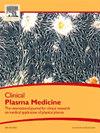Immunogenic Cell Death In Murine Colon-Carcinoma Cells Following Exposure To Cold Physical Plasma-Treated Saline Solution
Abstract
Diffuse peritoneal metastasis of gastrointestinal tumors is a life-threatening complication in end-stage tumor patients. Standard of care is hyperthermic intraperitoneal chemotherapy (HIPEC) and/or radiation therapy, both associated with significant side effects [1]. Previous studies have suggested that cold physical plasma may present a new anti-tumor tool with few to none side effects [2]. Moreover, plasma-induced reactive species can be transferred to cell culture medium where they react to more stable entities. We were able to demonstrate that phosphate-buffered saline (PBS) treated with cold physical plasma has toxic effects on mouse carcinoma cells cultured in 2D. We observed a reduced metabolic activities and apoptotic cell death. Morphological alterations, such as spiking of nuclei and changes in the shape of cytofilaments were also visible. Accordingly, treatment increased cell stiffness and reduced cell motility. Cancer cells are able to develop several mechanisms to subvert and avoid immune response. Danger associated molecular patterns (DAMPs) are linked to an immunogenic cell death (ICD) [3]. We observed an upregulation of DAMPs on the cell surface as well as increased concentrations in the cell’s liquid surroundings following incubation with plasma-treated saline. The activation of the immune system for cancer therapy is a promising approach. Animal experiments will show whether plasma-treated saline solution is effective in vivo and could be in principle considered for medical application.

 求助内容:
求助内容: 应助结果提醒方式:
应助结果提醒方式:


